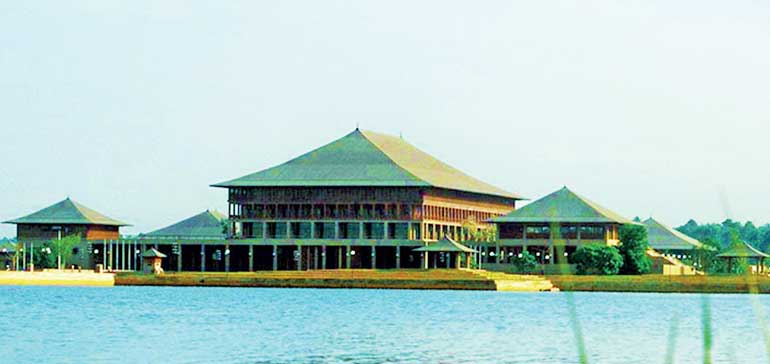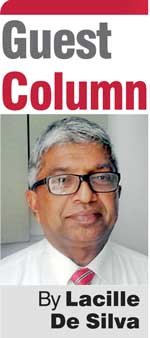Thursday Feb 12, 2026
Thursday Feb 12, 2026
Tuesday, 6 March 2018 00:00 - - {{hitsCtrl.values.hits}}

Parliament is the bedrock institution in our democratic system, which should play a critical role to promote democracy and good governance, while ensuring a government by the people and for the people
Undue dominance exercised by the Executive President over the Parliament for several decades has been a serious drawback in Sri Lanka. The Opposition too has been weakened and rendered ineffective by the President. Furthermore, the enthusiasm to learn parliamentary practice and procedure of parliamentarians and lack of knowledge have also been a major cause for the deterioration of standards both in Parliament and the country.
The elected representatives have deliriously failed to bear in mind that they are duty bound to perform the task of representing the people, (representative function), execute far-reaching duties and responsibilities in legislation (legislative function), and to oversee Government control (control function).
They have failed to give good leadership to formulate development policies as an efficient, responsible, open and accountable Parliament, while engaging more closely with citizens, and local authorities in shaping, preparing and implementing and monitoring development policies and plans at local provincial and national level in a transparent, citizen-centric and people friendly manner.
Parliament is the bedrock institution in our democratic system, which should play a critical role to promote democracy and good governance, while ensuring a government by the people and for the people. Having defeated the former regime in 2015, the present Government has failed to consolidate the agenda of strengthening the institutions and the democratisation process. The massive defeat at the Local Government elections leave no room for them to revive the program. Yahapalana team did not foresee that the political winds change in Sri Lanka!
Major issues before the country
Parliament
oversight functions, for budgetary and financial control, committees, overall efficiency and effectiveness of entire parliamentary process;
Public service
Public Finance Management (PFM)
Improvements of standards required in the delivery
of public services
Honesty, Impartiality, Openness, Accountability, Accuracy, Fairness, Integrity, Transparency, Objectivity and Reliability –
Responsibilities of the citizen/Government
In a democracy, the people should also be aware that they have the space to interact , intervene and participate in day-to-day governance issues that affect their lives to ascertain whether public officers are guided by rules and have used resources and authority in a transparent, accountable, effective and an equitable manner to benefit the community.
They must play and active role in a democracy. They should not remain as silent spectators;
Due to lack of oversight, checks and balances, transparency, breakdown of parliamentary system, wasteful spending decisions have resulted in excessive physical deficits and balance of payments crises.
Professor Nicholas Van de Walle, Cornell University, had pointed out that substantial amount of increased aid given to developing countries continuously had prevented suitable reforms leading to economic growth. Under similar circumstances, corrupt leaders, who are rent-seekers had disregarded the need to deal with the challenges of state building. Professor Walle had also argued that continuation of aid could finally end up in state failure.
Youth in Sri Lanka are becoming more and more disgruntled due to drugs, poor education, high rate of unemployment, alcohol and numerous other reasons. Some youth are fighting against the system. It appears they engage themselves in violent activities due to unequal opportunities and deprivation.
Frustration, resulting from the non-delivery of material benefits by successive governments have led youth, including adults, to seek opportunities to acquire wealth and prosperity elsewhere, drug trade, etc. These problems have not been adequately addressed together with the psychological factors involved.
Need to establish a National Commission for Education plus other independent commissions
The first Minister of Education (1931-1947) the late C.W.W. Kannangara’s contribution having laid the foundation for a national system education, which should now be given constitutional recognition, since educational opportunities to people must be strengthened to build a prosperous nation.
The Education Ordinance No. 31 of 1939 – a comprehensive ordinance covering all aspects of education to lay the foundation for a national system of education, introduced purely on the initiative of Dr. Kannangara remains as the basic law of education, embracing primary, secondary and tertiary levels, in Sri Lanka to-date.
His goal was to ensure a genuine democratisation of education through the provision of equal opportunities for all children irrespective of social class, economic condition, religion and ethnicity. He had stressed that a curriculum was needed for every child in the country to develop his “head, heart and hands” and (1) academic knowledge (2) aesthetic values and (3) practical skills.
In conclusion, let me add the country now needs a credible group of truly patriotic, honest, hardworking, dedicated and capable, passionate professionals to craft a political solution urgently, with strategy and determination. Their goal should be to create a robust democracy from a weak democracy. A passively peaceful country to a reconstructed realistic peaceful country.
Moreover, they should create a country where all ethnic communities could live as equals. They should be able to dispel mistrust against each other to enjoy fruits of a successful nation. If so, future Sri Lankans should be provided accessibility to shared political future where equality, justice, peace, harmony, law and order, freedom, meritocracy and unity would ensure growth and development.